Ethical Dilemmas in Healthcare: Sociology and Blood Transfusions
VerifiedAdded on 2021/12/27
|6
|1412
|23
Essay
AI Summary
This essay delves into the ethical dilemmas present within the healthcare profession, with a specific focus on the sociological aspects of these issues. The core argument revolves around the ethical considerations of blood transfusions, particularly when patient consent is a factor, and the potential conflict with religious beliefs, such as those of Jehovah's Witnesses. The essay explores the importance of obtaining valid consent, the legal principles governing medical practice, and the ethical implications of cosmetic surgery for teenagers. It also touches on related issues like euthanasia and refusing treatment to certain patient demographics. The author emphasizes the need for healthcare professionals to adhere to ethical principles and legal guidelines while prioritizing patient well-being. The essay concludes by highlighting the complexities of blood transfusion procedures and advocating for informed consent and ethical decision-making in all aspects of healthcare. The paper also references various guidelines and legal frameworks like the Directive 2001/83/EC.
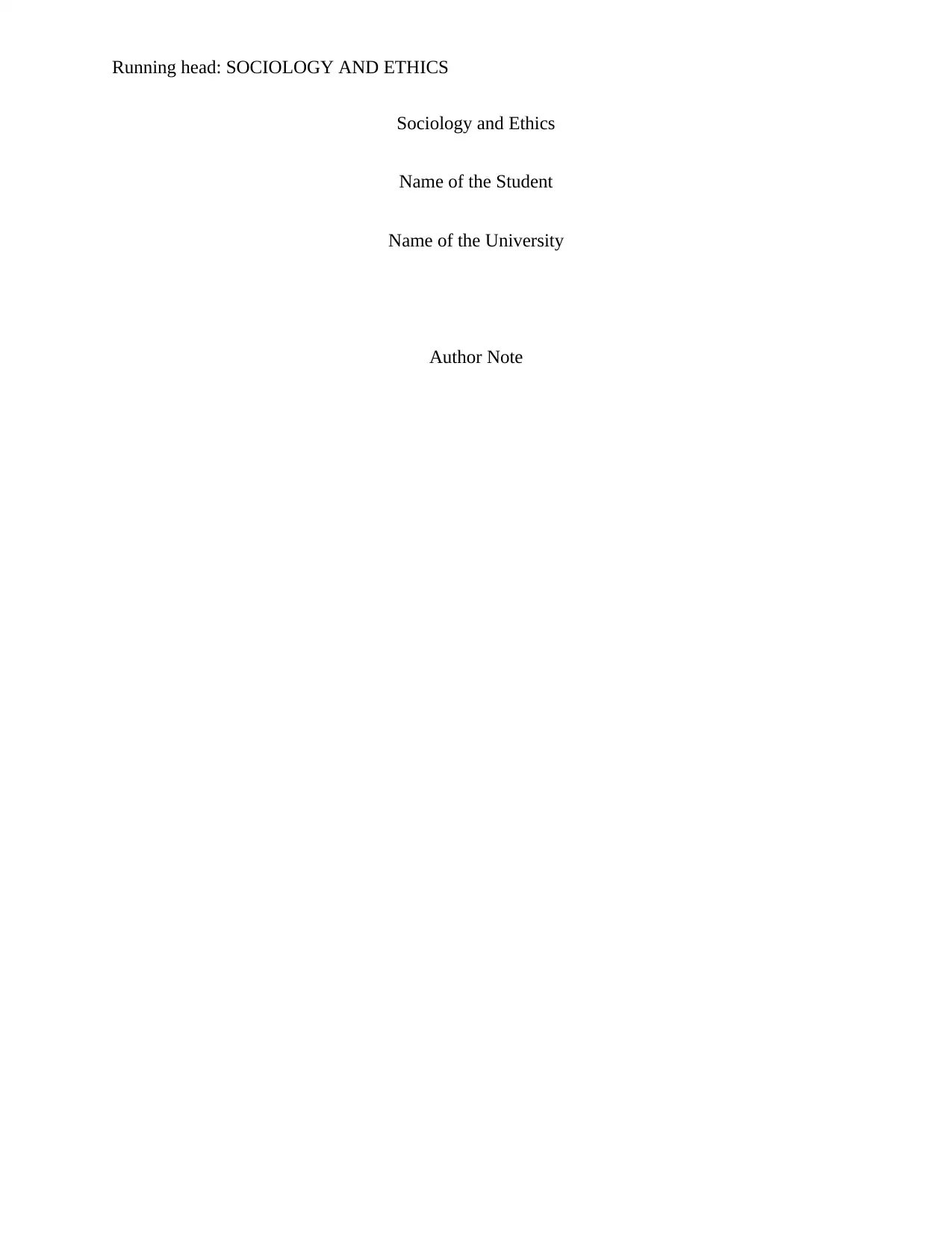
Running head: SOCIOLOGY AND ETHICS
Sociology and Ethics
Name of the Student
Name of the University
Author Note
Sociology and Ethics
Name of the Student
Name of the University
Author Note
Paraphrase This Document
Need a fresh take? Get an instant paraphrase of this document with our AI Paraphraser
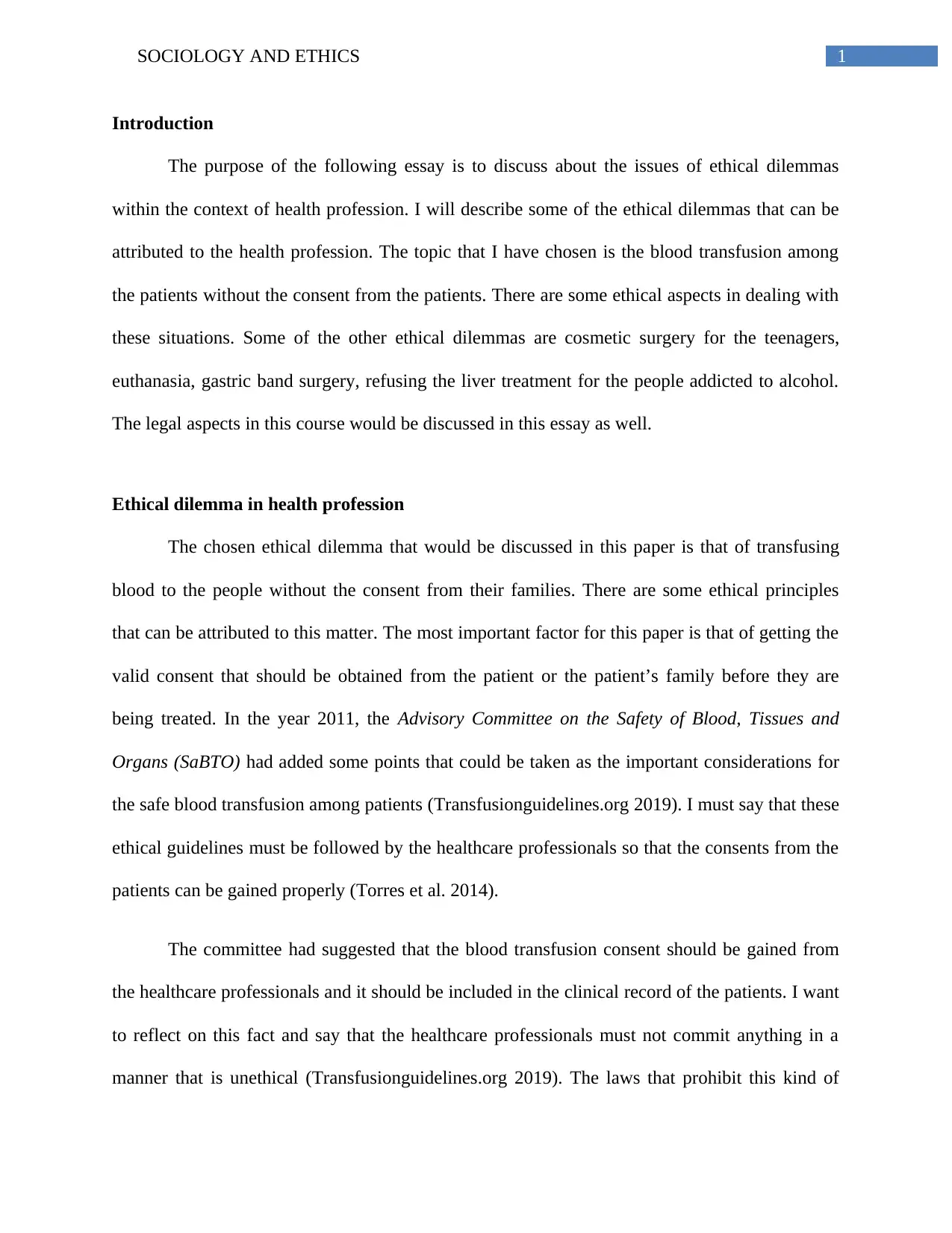
1SOCIOLOGY AND ETHICS
Introduction
The purpose of the following essay is to discuss about the issues of ethical dilemmas
within the context of health profession. I will describe some of the ethical dilemmas that can be
attributed to the health profession. The topic that I have chosen is the blood transfusion among
the patients without the consent from the patients. There are some ethical aspects in dealing with
these situations. Some of the other ethical dilemmas are cosmetic surgery for the teenagers,
euthanasia, gastric band surgery, refusing the liver treatment for the people addicted to alcohol.
The legal aspects in this course would be discussed in this essay as well.
Ethical dilemma in health profession
The chosen ethical dilemma that would be discussed in this paper is that of transfusing
blood to the people without the consent from their families. There are some ethical principles
that can be attributed to this matter. The most important factor for this paper is that of getting the
valid consent that should be obtained from the patient or the patient’s family before they are
being treated. In the year 2011, the Advisory Committee on the Safety of Blood, Tissues and
Organs (SaBTO) had added some points that could be taken as the important considerations for
the safe blood transfusion among patients (Transfusionguidelines.org 2019). I must say that these
ethical guidelines must be followed by the healthcare professionals so that the consents from the
patients can be gained properly (Torres et al. 2014).
The committee had suggested that the blood transfusion consent should be gained from
the healthcare professionals and it should be included in the clinical record of the patients. I want
to reflect on this fact and say that the healthcare professionals must not commit anything in a
manner that is unethical (Transfusionguidelines.org 2019). The laws that prohibit this kind of
Introduction
The purpose of the following essay is to discuss about the issues of ethical dilemmas
within the context of health profession. I will describe some of the ethical dilemmas that can be
attributed to the health profession. The topic that I have chosen is the blood transfusion among
the patients without the consent from the patients. There are some ethical aspects in dealing with
these situations. Some of the other ethical dilemmas are cosmetic surgery for the teenagers,
euthanasia, gastric band surgery, refusing the liver treatment for the people addicted to alcohol.
The legal aspects in this course would be discussed in this essay as well.
Ethical dilemma in health profession
The chosen ethical dilemma that would be discussed in this paper is that of transfusing
blood to the people without the consent from their families. There are some ethical principles
that can be attributed to this matter. The most important factor for this paper is that of getting the
valid consent that should be obtained from the patient or the patient’s family before they are
being treated. In the year 2011, the Advisory Committee on the Safety of Blood, Tissues and
Organs (SaBTO) had added some points that could be taken as the important considerations for
the safe blood transfusion among patients (Transfusionguidelines.org 2019). I must say that these
ethical guidelines must be followed by the healthcare professionals so that the consents from the
patients can be gained properly (Torres et al. 2014).
The committee had suggested that the blood transfusion consent should be gained from
the healthcare professionals and it should be included in the clinical record of the patients. I want
to reflect on this fact and say that the healthcare professionals must not commit anything in a
manner that is unethical (Transfusionguidelines.org 2019). The laws that prohibit this kind of
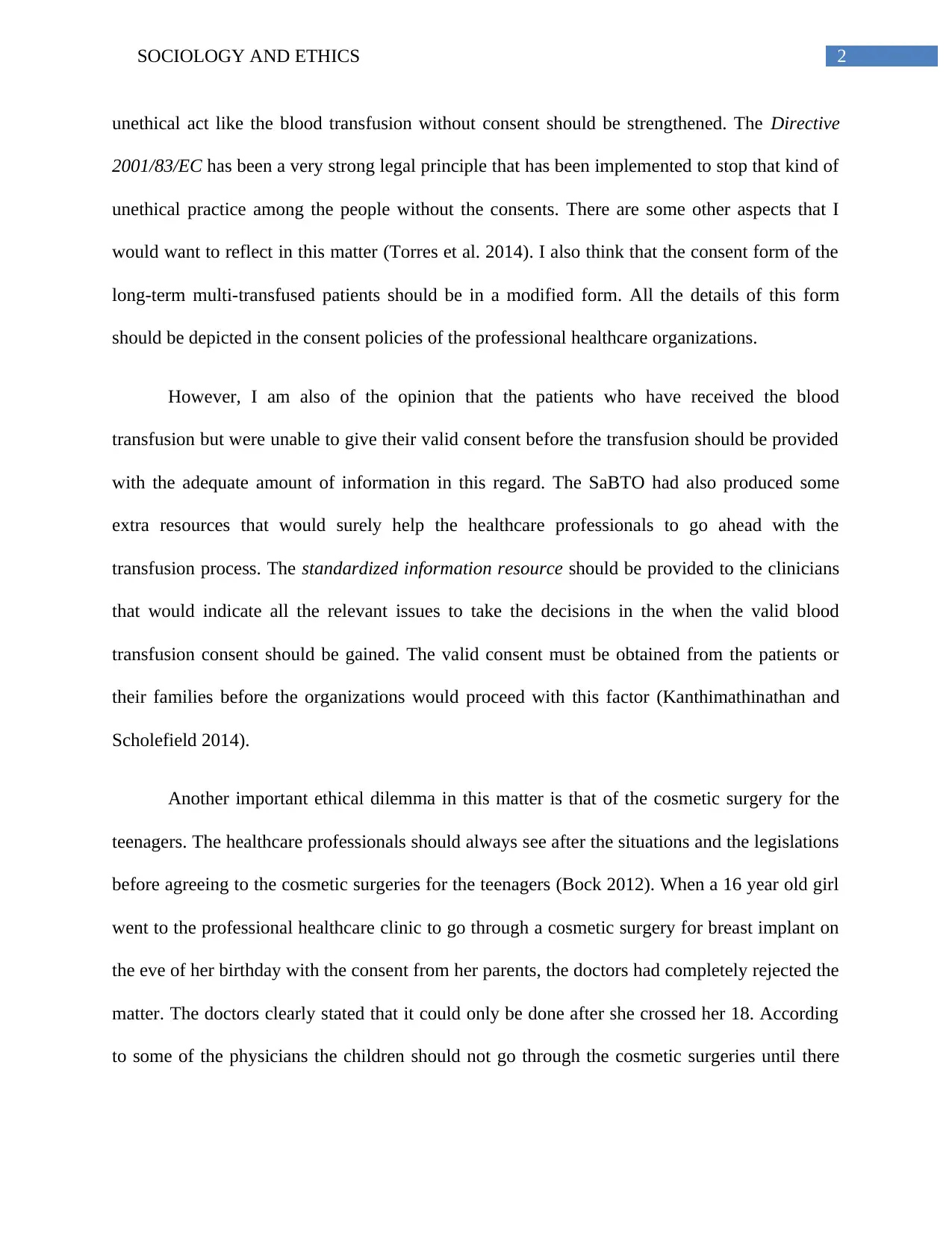
2SOCIOLOGY AND ETHICS
unethical act like the blood transfusion without consent should be strengthened. The Directive
2001/83/EC has been a very strong legal principle that has been implemented to stop that kind of
unethical practice among the people without the consents. There are some other aspects that I
would want to reflect in this matter (Torres et al. 2014). I also think that the consent form of the
long-term multi-transfused patients should be in a modified form. All the details of this form
should be depicted in the consent policies of the professional healthcare organizations.
However, I am also of the opinion that the patients who have received the blood
transfusion but were unable to give their valid consent before the transfusion should be provided
with the adequate amount of information in this regard. The SaBTO had also produced some
extra resources that would surely help the healthcare professionals to go ahead with the
transfusion process. The standardized information resource should be provided to the clinicians
that would indicate all the relevant issues to take the decisions in the when the valid blood
transfusion consent should be gained. The valid consent must be obtained from the patients or
their families before the organizations would proceed with this factor (Kanthimathinathan and
Scholefield 2014).
Another important ethical dilemma in this matter is that of the cosmetic surgery for the
teenagers. The healthcare professionals should always see after the situations and the legislations
before agreeing to the cosmetic surgeries for the teenagers (Bock 2012). When a 16 year old girl
went to the professional healthcare clinic to go through a cosmetic surgery for breast implant on
the eve of her birthday with the consent from her parents, the doctors had completely rejected the
matter. The doctors clearly stated that it could only be done after she crossed her 18. According
to some of the physicians the children should not go through the cosmetic surgeries until there
unethical act like the blood transfusion without consent should be strengthened. The Directive
2001/83/EC has been a very strong legal principle that has been implemented to stop that kind of
unethical practice among the people without the consents. There are some other aspects that I
would want to reflect in this matter (Torres et al. 2014). I also think that the consent form of the
long-term multi-transfused patients should be in a modified form. All the details of this form
should be depicted in the consent policies of the professional healthcare organizations.
However, I am also of the opinion that the patients who have received the blood
transfusion but were unable to give their valid consent before the transfusion should be provided
with the adequate amount of information in this regard. The SaBTO had also produced some
extra resources that would surely help the healthcare professionals to go ahead with the
transfusion process. The standardized information resource should be provided to the clinicians
that would indicate all the relevant issues to take the decisions in the when the valid blood
transfusion consent should be gained. The valid consent must be obtained from the patients or
their families before the organizations would proceed with this factor (Kanthimathinathan and
Scholefield 2014).
Another important ethical dilemma in this matter is that of the cosmetic surgery for the
teenagers. The healthcare professionals should always see after the situations and the legislations
before agreeing to the cosmetic surgeries for the teenagers (Bock 2012). When a 16 year old girl
went to the professional healthcare clinic to go through a cosmetic surgery for breast implant on
the eve of her birthday with the consent from her parents, the doctors had completely rejected the
matter. The doctors clearly stated that it could only be done after she crossed her 18. According
to some of the physicians the children should not go through the cosmetic surgeries until there
⊘ This is a preview!⊘
Do you want full access?
Subscribe today to unlock all pages.

Trusted by 1+ million students worldwide
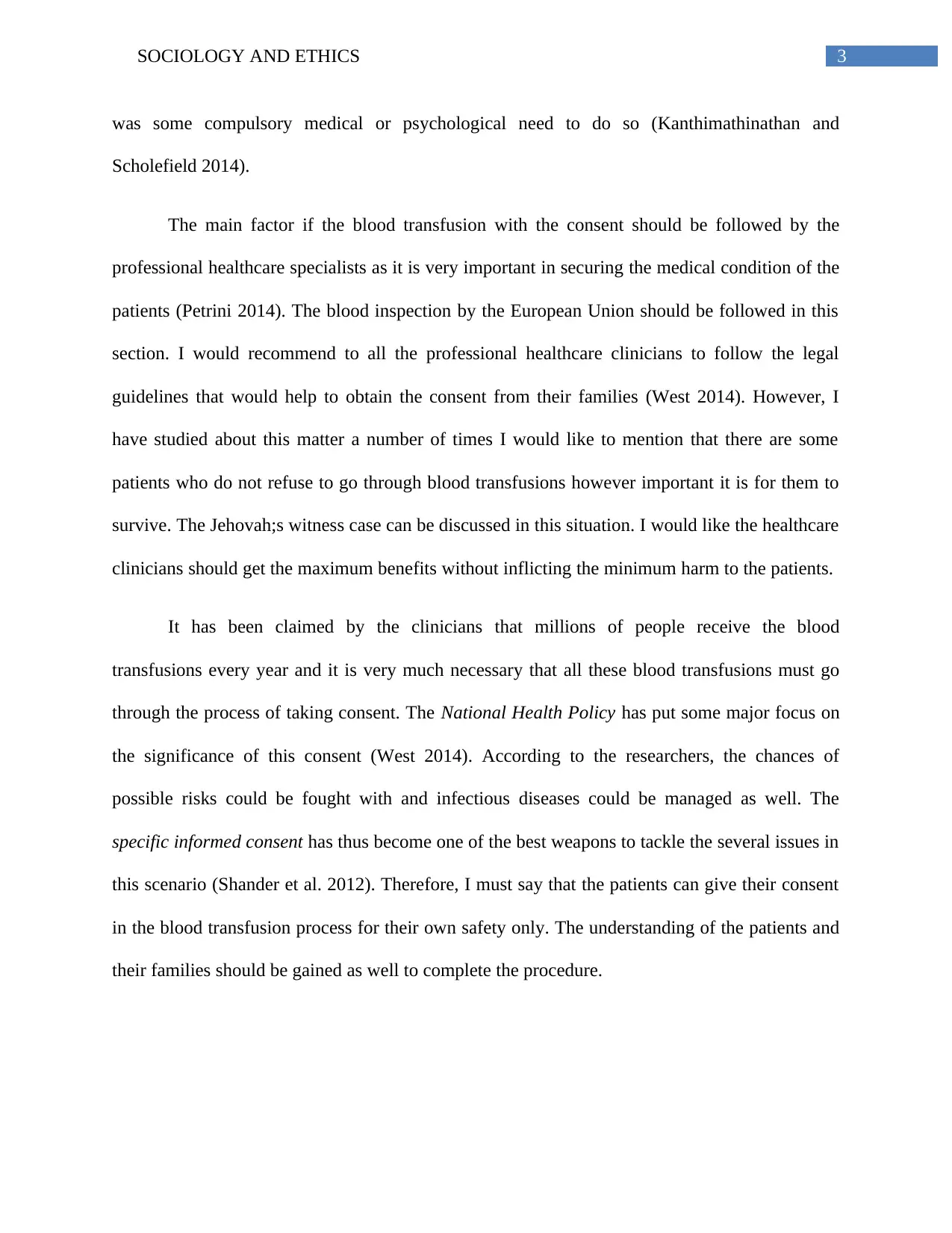
3SOCIOLOGY AND ETHICS
was some compulsory medical or psychological need to do so (Kanthimathinathan and
Scholefield 2014).
The main factor if the blood transfusion with the consent should be followed by the
professional healthcare specialists as it is very important in securing the medical condition of the
patients (Petrini 2014). The blood inspection by the European Union should be followed in this
section. I would recommend to all the professional healthcare clinicians to follow the legal
guidelines that would help to obtain the consent from their families (West 2014). However, I
have studied about this matter a number of times I would like to mention that there are some
patients who do not refuse to go through blood transfusions however important it is for them to
survive. The Jehovah;s witness case can be discussed in this situation. I would like the healthcare
clinicians should get the maximum benefits without inflicting the minimum harm to the patients.
It has been claimed by the clinicians that millions of people receive the blood
transfusions every year and it is very much necessary that all these blood transfusions must go
through the process of taking consent. The National Health Policy has put some major focus on
the significance of this consent (West 2014). According to the researchers, the chances of
possible risks could be fought with and infectious diseases could be managed as well. The
specific informed consent has thus become one of the best weapons to tackle the several issues in
this scenario (Shander et al. 2012). Therefore, I must say that the patients can give their consent
in the blood transfusion process for their own safety only. The understanding of the patients and
their families should be gained as well to complete the procedure.
was some compulsory medical or psychological need to do so (Kanthimathinathan and
Scholefield 2014).
The main factor if the blood transfusion with the consent should be followed by the
professional healthcare specialists as it is very important in securing the medical condition of the
patients (Petrini 2014). The blood inspection by the European Union should be followed in this
section. I would recommend to all the professional healthcare clinicians to follow the legal
guidelines that would help to obtain the consent from their families (West 2014). However, I
have studied about this matter a number of times I would like to mention that there are some
patients who do not refuse to go through blood transfusions however important it is for them to
survive. The Jehovah;s witness case can be discussed in this situation. I would like the healthcare
clinicians should get the maximum benefits without inflicting the minimum harm to the patients.
It has been claimed by the clinicians that millions of people receive the blood
transfusions every year and it is very much necessary that all these blood transfusions must go
through the process of taking consent. The National Health Policy has put some major focus on
the significance of this consent (West 2014). According to the researchers, the chances of
possible risks could be fought with and infectious diseases could be managed as well. The
specific informed consent has thus become one of the best weapons to tackle the several issues in
this scenario (Shander et al. 2012). Therefore, I must say that the patients can give their consent
in the blood transfusion process for their own safety only. The understanding of the patients and
their families should be gained as well to complete the procedure.
Paraphrase This Document
Need a fresh take? Get an instant paraphrase of this document with our AI Paraphraser
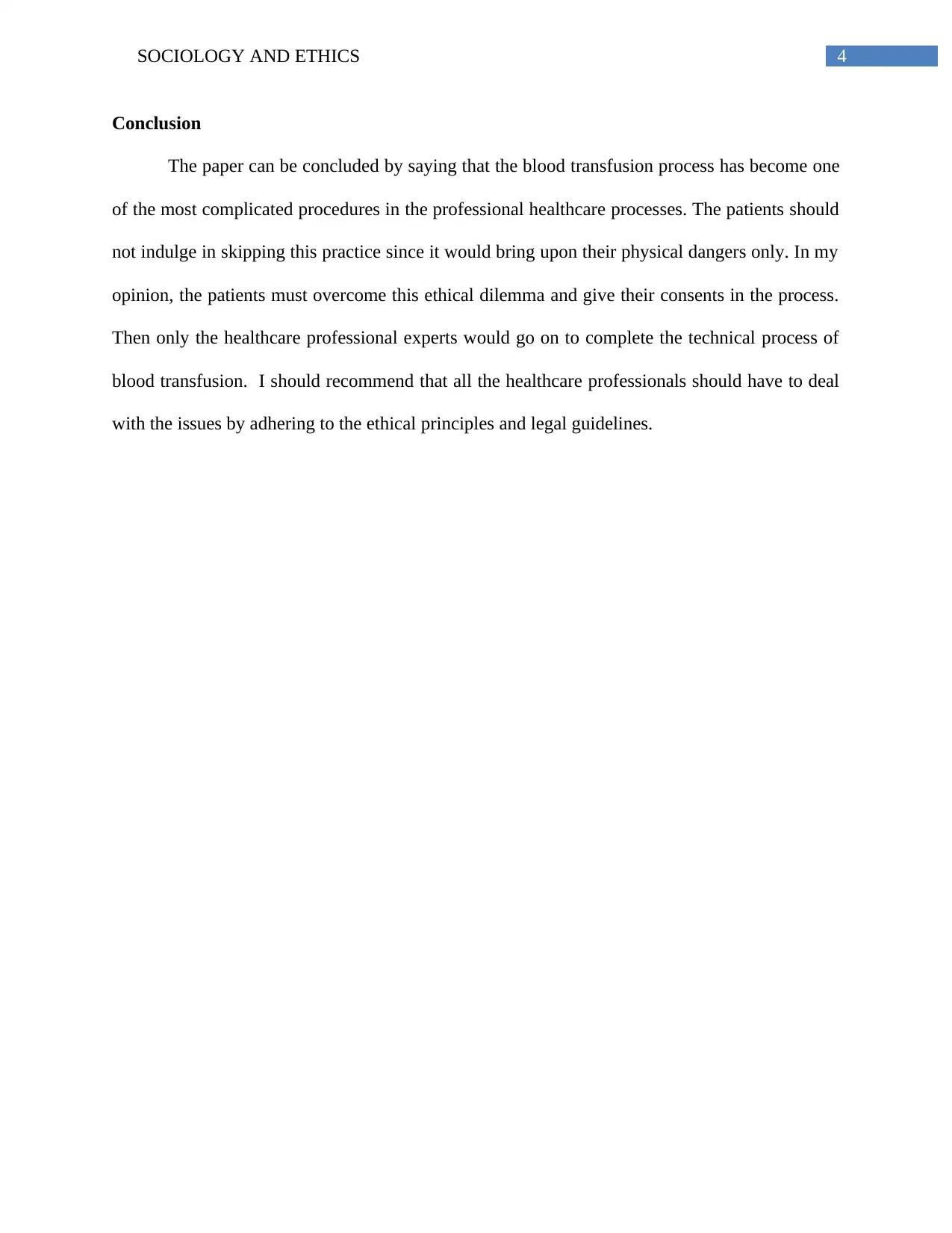
4SOCIOLOGY AND ETHICS
Conclusion
The paper can be concluded by saying that the blood transfusion process has become one
of the most complicated procedures in the professional healthcare processes. The patients should
not indulge in skipping this practice since it would bring upon their physical dangers only. In my
opinion, the patients must overcome this ethical dilemma and give their consents in the process.
Then only the healthcare professional experts would go on to complete the technical process of
blood transfusion. I should recommend that all the healthcare professionals should have to deal
with the issues by adhering to the ethical principles and legal guidelines.
Conclusion
The paper can be concluded by saying that the blood transfusion process has become one
of the most complicated procedures in the professional healthcare processes. The patients should
not indulge in skipping this practice since it would bring upon their physical dangers only. In my
opinion, the patients must overcome this ethical dilemma and give their consents in the process.
Then only the healthcare professional experts would go on to complete the technical process of
blood transfusion. I should recommend that all the healthcare professionals should have to deal
with the issues by adhering to the ethical principles and legal guidelines.
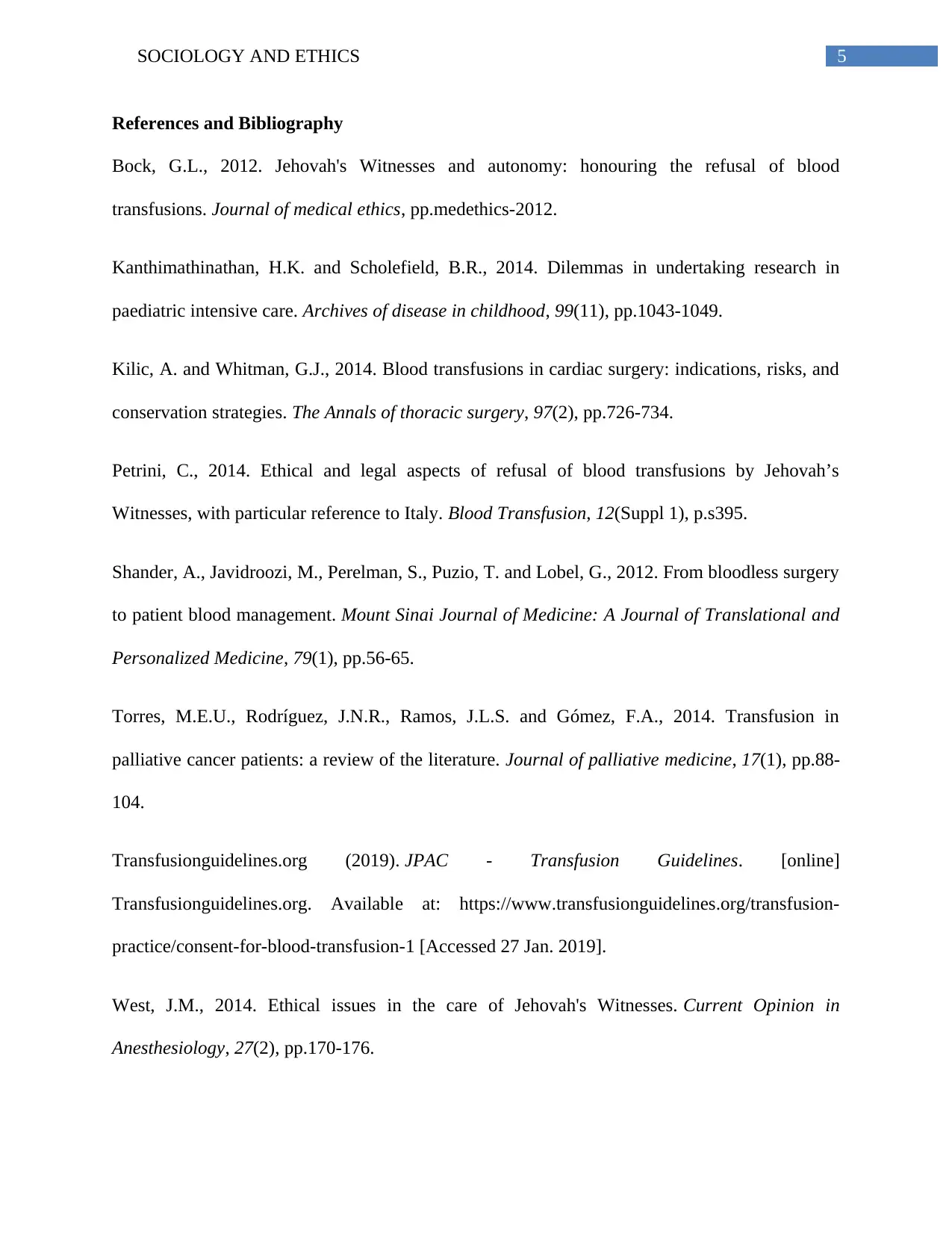
5SOCIOLOGY AND ETHICS
References and Bibliography
Bock, G.L., 2012. Jehovah's Witnesses and autonomy: honouring the refusal of blood
transfusions. Journal of medical ethics, pp.medethics-2012.
Kanthimathinathan, H.K. and Scholefield, B.R., 2014. Dilemmas in undertaking research in
paediatric intensive care. Archives of disease in childhood, 99(11), pp.1043-1049.
Kilic, A. and Whitman, G.J., 2014. Blood transfusions in cardiac surgery: indications, risks, and
conservation strategies. The Annals of thoracic surgery, 97(2), pp.726-734.
Petrini, C., 2014. Ethical and legal aspects of refusal of blood transfusions by Jehovah’s
Witnesses, with particular reference to Italy. Blood Transfusion, 12(Suppl 1), p.s395.
Shander, A., Javidroozi, M., Perelman, S., Puzio, T. and Lobel, G., 2012. From bloodless surgery
to patient blood management. Mount Sinai Journal of Medicine: A Journal of Translational and
Personalized Medicine, 79(1), pp.56-65.
Torres, M.E.U., Rodríguez, J.N.R., Ramos, J.L.S. and Gómez, F.A., 2014. Transfusion in
palliative cancer patients: a review of the literature. Journal of palliative medicine, 17(1), pp.88-
104.
Transfusionguidelines.org (2019). JPAC - Transfusion Guidelines. [online]
Transfusionguidelines.org. Available at: https://www.transfusionguidelines.org/transfusion-
practice/consent-for-blood-transfusion-1 [Accessed 27 Jan. 2019].
West, J.M., 2014. Ethical issues in the care of Jehovah's Witnesses. Current Opinion in
Anesthesiology, 27(2), pp.170-176.
References and Bibliography
Bock, G.L., 2012. Jehovah's Witnesses and autonomy: honouring the refusal of blood
transfusions. Journal of medical ethics, pp.medethics-2012.
Kanthimathinathan, H.K. and Scholefield, B.R., 2014. Dilemmas in undertaking research in
paediatric intensive care. Archives of disease in childhood, 99(11), pp.1043-1049.
Kilic, A. and Whitman, G.J., 2014. Blood transfusions in cardiac surgery: indications, risks, and
conservation strategies. The Annals of thoracic surgery, 97(2), pp.726-734.
Petrini, C., 2014. Ethical and legal aspects of refusal of blood transfusions by Jehovah’s
Witnesses, with particular reference to Italy. Blood Transfusion, 12(Suppl 1), p.s395.
Shander, A., Javidroozi, M., Perelman, S., Puzio, T. and Lobel, G., 2012. From bloodless surgery
to patient blood management. Mount Sinai Journal of Medicine: A Journal of Translational and
Personalized Medicine, 79(1), pp.56-65.
Torres, M.E.U., Rodríguez, J.N.R., Ramos, J.L.S. and Gómez, F.A., 2014. Transfusion in
palliative cancer patients: a review of the literature. Journal of palliative medicine, 17(1), pp.88-
104.
Transfusionguidelines.org (2019). JPAC - Transfusion Guidelines. [online]
Transfusionguidelines.org. Available at: https://www.transfusionguidelines.org/transfusion-
practice/consent-for-blood-transfusion-1 [Accessed 27 Jan. 2019].
West, J.M., 2014. Ethical issues in the care of Jehovah's Witnesses. Current Opinion in
Anesthesiology, 27(2), pp.170-176.
⊘ This is a preview!⊘
Do you want full access?
Subscribe today to unlock all pages.

Trusted by 1+ million students worldwide
1 out of 6
Related Documents
Your All-in-One AI-Powered Toolkit for Academic Success.
+13062052269
info@desklib.com
Available 24*7 on WhatsApp / Email
![[object Object]](/_next/static/media/star-bottom.7253800d.svg)
Unlock your academic potential
Copyright © 2020–2026 A2Z Services. All Rights Reserved. Developed and managed by ZUCOL.




